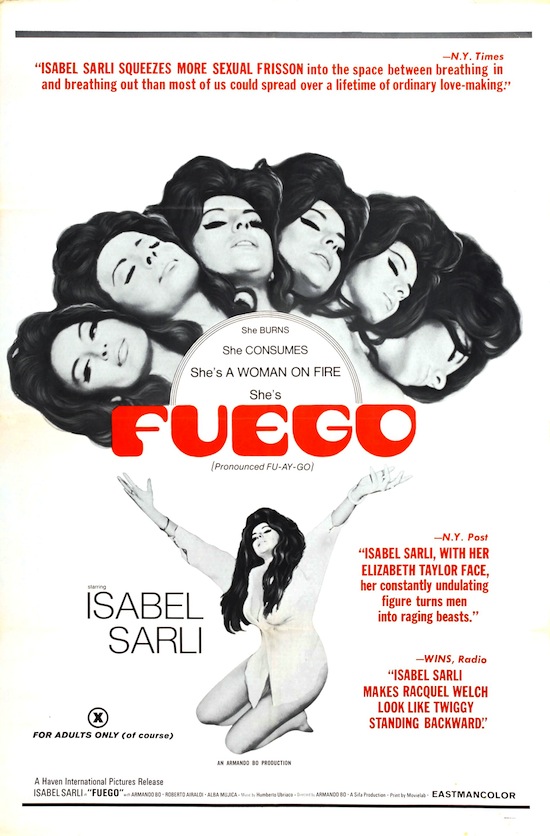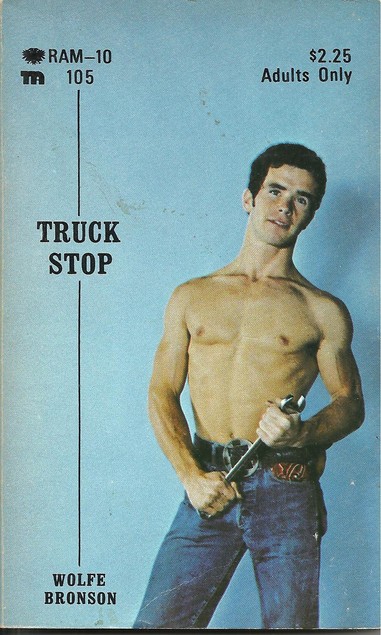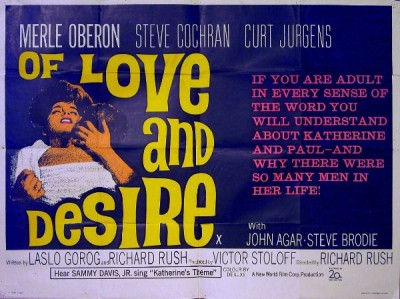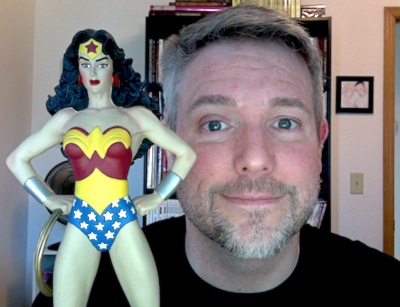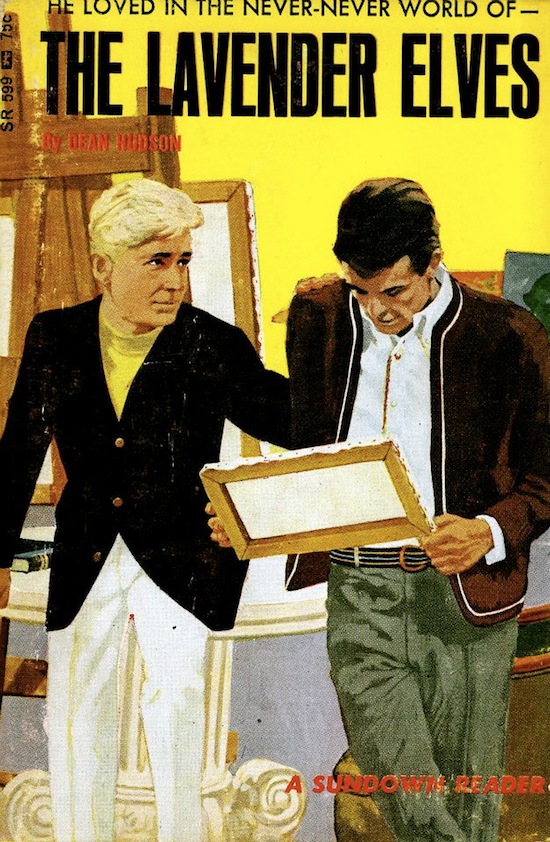Cool Cinema Trash: Fuego (1969)
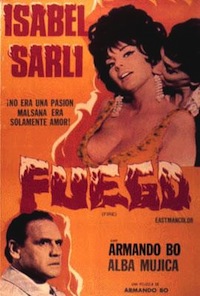 She burns. She consumes. She’s a woman on fire. She’s Fuego.
She burns. She consumes. She’s a woman on fire. She’s Fuego.
Though mostly unknown to audiences in the U.S., Isabel Sarli is a bona-fide sex goddess in Latin America. Director Armando Bo discovered the beautifuly buxom former Miss Argentina and quickly put Sarli to work in his colorfully melodramatic sexploitation films. Bo directed his favorite leading lady in such films as Carne (1968) and Put Up or Shut Up (1958).
What it’s all about: Fuego (1969) begins with the sexually insatiable Laura (Sarli) trying to cool her burning desires with a refreshing dip in a picturesque lake. Laura’s devoted lesbian housekeeper Andrea (Alba Mugica) helps her dry her remarkably feminine curves. Laura doesn’t seem to mind the impromptu massage from her amorous maid, but when a stud on a stallion rides up and witnesses their little tete a tete, Laura is suddenly overcome with modesty and puts on a robe.
Later at home, Laura tells her Andrea that, “At times, I love you so much, at others… I despise you!” The characters in Fuego are constantly making bold and melodramatic statements. It’s as if every thought they express were followed by several exclamation points, and if you happen to be watching the English subtitled version, they often are!
Laura admires her bountiful assets in a full-length mirror while dressing for a party. The passion Andrea feels for her employer is almost as strong as Laura’s lust for men. “You’re insatiable,” Andrea chastises, “Your longings are endless. You’re a mix of angel and demon.”
At the party, two women watch as Laura romances her current paramour. “In the end,” one of them quips, “She’ll really fall in love.”
“She still has ten to go at least. She’s shameless.”
True to form, as soon as the gent leaves, Laura sets her sights on the man who watched her by the lake that afternoon. Carlos (director Armando Bo) cannot resist her as she pouts and preens in her Liz Taylor wig and gargantuan false eyelashes. It takes only a few moments for him to become bewitched by this south of the border siren.
They leave the party together. In the garden outside, Carlos proclaims his love, “I think I’ve lived long enough to realize that you are the woman I’ve always been waiting for.” He kisses her. They proceed to make love in front of a chicken coop while the wacky theme song throbs away on the soundtrack. The love theme from Fuego (a sultry rumba played on a Wurlitzer) is deliriously kitschy and, aside from Sarli, the most memorable thing about the film.
While horseback riding in the mountains, Laura declares that, despite their snowy surroundings, “I feel my blood boiling.”
“You’re the most voluptuous of all women,” Carlos tells her. He proposes on the spot, but Laura honestly doesn’t know if she can be faithful. He promises to always stand by her and help defend her from herself.
“I don’t know if I’m fickle or evil,” she ponders, “I want to be good.”
To try and cool her seemingly insatiable longings, she rolls around in a snow bank. But the question remains, why should she be good when she’s so great at being bad? Even after a succession of other men, Carlos still wants to marry her. She finally relents.
Andrea is upset by the news, afraid that the occasional romps she shares with her mistress will end. “You’ll drive him crazy, he’ll end up killing you. You will not get married!” Andrea is brought to hysterical tears and passion quickly turns to violence as a catfight ensues.
“I love him,” Laura insists, “He’s a man, Andrea. He’s a man.”
Laura says her “I do’s” in a white wedding gown, and her nuptials are consummated in front of a crackling fire. Though Sarli and Bo were famous lovers off screen, their chemistry on screen is lukewarm at best. They go through all the motions, but their love scenes are remarkably unsexy thanks in no small part to Bo’s fumbling romantic moves. “Fuego!” a Spanish troubadour bleats on the soundtrack as the newlyweds later canoodle on the rocky shore of the lake where they first saw one another.
One day, after Carlos has left for work, Laura pleasures herself while still in bed. But caressing her own bountiful curves isn’t enough. She puts on gloves, go-go boots, a fur coat and heads into town where she proceeds to flash every man she comes across. Though most of the men think she’s muy loco, one finally submits and they drive up into the hills where Laura does a strip tease against a tree. She is a panting, writhing, desperate ball of passion aflame!
Once the stranger has had his way with her, he leaves her stranded. Laura sheds tears of shame as she begins her long walk home. When Carlos finds the house empty, he goes in search of his wife. When he finds her, Laura asks, “Do you forgive me my love?”
He does.
While Carlos spends his days working as an engineer, Laura amuses herself with various men. She sometimes even bids her devoted and maid to satisfy her urges… not that Andrea minds. One day, after an afternoon spent in the company of another man, Carlos demands to know where Laura has been. “I walked around aimlessly and thought about you,” she lies. When he presses her for the truth, she confesses, “I thought of killing myself. With you I learned to love. I’m afraid of losing you, I’d like for you to kill me. I feel a powerful need to die.” Laura’s inability to remain faithful weighs heavy on her conscious. “Life is all I have. I offer it to you, take it from me!” she pleads. Despite her unholy passions, he still loves her.
Laura still cannot get enough. One afternoon, Carlos returns home to find his wife in someone else’s arms. “I only came to fix the refrigerator!” the man insists. Once he has chased the stranger from his marriage bed, Carlos threatens his nymphomaniacal wife with a gun.
“I’m going to kill you! You’re a whore!” he cries in the best tradition of soap opera theatrics.
“Kill me… please!” she begs. Sarli really acts up a storm, emoting as if her life truly depended on it. “I love you, but I feel an internal fire devouring me, a sexual fury that kills me. I need men!”
Carlos finally seeks outside help. “Your wife is gravely ill,” a doctor tells him. The physician proceeds to give an amusingly earnest textbook lecture on the “pathological exaggeration of the libido”, the heartbreak that is nymphomania.
Laura agrees to a full examination. Even the purely professional touch of a gynecologist sets her passions ablaze. In a moment that must be seen to be believed, Laura pants and writhes while on the exam table. “Go on doctor,” she moans, “Keep doing that.”
Carlos fires Andrea. How can poor Laura ever expect to get better with a salivating sister of Sappho willing to cater to her every sexual whim? “You have taken advantage of a poor sick woman to satisfy your low instincts.” Andrea insists that her love for her mistress is pure, but leaves anyway, knowing that it’s in Laura’s best interest.
Carlos and Laura fly to the U.S. in search for a cure. Surely they can find an expert on sexual deviancy in New York City. A brief consultation with a physician offers little hope, “With God’s help, everything will be alright.” Gee, thanks doc.
Left to her own devices, Laura hooks up with a greaser in Times Square. Later, on the rooftop of her hotel, Laura contemplates ending it all. If she cannot remain faithful to the one man that she truly loves, then life just isn’t worth living. With the New York skyline beckoning her to jump, a marching band inexplicably blares on the soundtrack. Carlos keeps her from taking the final leap, but she firmly believes that her, “Illness can only be cured by disappearing forever.”
The film spirals towards it’s loony climax when the troubled couple return home and Laura continues with her slatternly ways. “Kill me! I beg you. I can’t live like this.”
“Yes Laura,” Carlos hilariously deadpans, “It’ll be for the best. For you and for me.” On a mountaintop, he holds a gun to her head, but cannot pull the trigger. “Don’t you see that I still love you? Cheat on me with everyone. I couldn’t live without you.”
After praying for guidance, Laura heads to a rocky hillside. In a flowing, diaphanous white gown, she holds her arms aloft and walks over the edge of a cliff.
While laying flowers at his wife’s grave, Carlos encounters a vision. In broad daylight, Laura’s ghostly apparition professes her undying love. “I’ll always be at your side, with my soul, my love.”
Unable to bear life without his beloved Laura, Carlos shoots himself, his lifeless body splayed over the grave of his wife. Their souls reunite and they walk away together hand in hand… lovers for all eternity.
In conclusion: Isabel Sarli and Armando Bo made an astonishing twenty-seven movies together. Many of these films featured variations on the sexual themes explored in Fuego. Bo favored stories about a sexy “good girl” who stirs the passions of the men around her or a sexy “bad girl” whose intense desires (nymphomania) always end in heartbreak. Bo is often referred to as the Argentinean Russ Meyer. Both Bo and Meyer were making similarly sexy and outrageous films around the same time, but where Meyer had a stable of curvaceous beauties to cast in his films, Isabel Sarli was Bo’s sole inspiration.
The colorfully sexy shenanigans of Sarli have been made available on DVD thanks to Something Weird Video. The film’s 1960’s color palate remains particularly vibrant, especially for a film of this rarity. The mono sound is also in good condition. Sadly, scratches and dirt on the print are evident throughout, though one imagines that it would be difficult to find a better or more complete version (Fuego was cut by censors in several countries) of this obscure classic. A second Sarli feature, The Female (aka Seventy Times Seven), is also included as part of the “sizzling Latin double feature”. The Female is a B&W arthouse western and one of the few films Sarli made without Bo. The disc includes several trailers for Fuego as well as other South American sexploitation titles. There are two short subjects as well, each featuring a pretty gal taking it off in a burlesque-style striptease.
Paperback Cover of the Week: Truck Stop
Cool Cinema Trash: Of Love and Desire (1963)
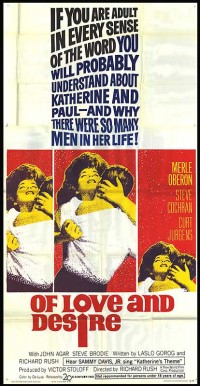 If you are an adult in every sense of the word, you will probably understand about Katherine and Paul – and why there were so many men in her life!
If you are an adult in every sense of the word, you will probably understand about Katherine and Paul – and why there were so many men in her life!
Part South of the border travelogue and part overheated melodrama, Of Love and Desire (1963) is a sherbet colored confection that will leave any bad movie aficionado salivating like a kid in a candy store.
What it’s all about: Shortly after arriving in sunny Acapulco, engineer Steve Corey (played by swarthy Steve Cochran) is whisked away to the home of wealthy mining magnate Paul Beckmann (Curt Jurgens). Steve feels a bit out of his element, for when he arrives, a swanky cocktail party is in full swing. A mariachi band (that doesn’t play mariachi music) winds through the crowds of finely attired guests. “I’m not exactly dressed for a party,” Steve apologizes to Paul’s sister Katherine (Merle Oberon).
“I’ll never understand why you men are never happy unless you’re all dressed alike,” she quips. In her tailored gown and upswept hairdo, Oberon looks like a matronly Holly Golightly.
Steve and Katherine flirt over conversation, drinks and dancing. Paul pointedly reminds his sister to behave herself. As the party begins to wind down, a contractor working on the same project as Steve tells him that Katherine may be just the girl Steve needs to forget about a recent broken engagement. “All you have to do is touch that dame and she goes off like a firecracker.”
As they stroll across the grounds of her brother’s home, Katherine comments on the beautiful night, despite the fact that the scene was obviously shot during the day. She asks Steve to accompany her to her nearby hacienda. While on their walk, Katherine reveals that Paul is her half-brother, a plot point that will prove important later on.
An unassuming street side door leads to Katherine’s secret garden. A heavenly choir “oohs” and “ahhs” as the camera pans across her verdant courtyard. After chatting about long-ago childhood games, Katherine offers Steve a nightcap. The proximity of Steve’s potent brand of masculinity sets her on edge and she accidentally drops his drink.
Up until this point, Of Love and Desire has been a colorful, if not unremarkable, melodrama. It’s when Katherine finally reveals her tortured desire for male companionship that the film kicks into high camp overdrive. A simple kiss goodnight unleashes Katherine’s inner wildcat. She pants and clutches at Steve, clawing at his shirt, leaving him momentarily stunned by her sudden passion.
“Did I give in too fast for you? Didn’t I play the game right? Just what do you need to make you feel like I’m a conquest? I should have pretended longer, but just how much longer… one hour… two?” she cries.
One second she’s literally begging for it, the next she’s shedding overwrought tears of shame. Katherine’s obvious schizophrenic sex addiction would send any sane man running for the hills, so what does Steve do? He takes her in his arms, lowers her down onto the couch and kisses her.
Church bells ring while the sun also rises. Steve awakens in Katherine’s bed, but finds her outside enjoying a morning swim. “I wish I were as young as you make me feel,” she coos. It has to be said that for a woman of fifty-two, Oberon cuts a rather fine figure in her two-piece swimming ensemble.
She asks him to join her in the azure waters of her garden pool. Steve goes to change in the poolside bungalow and finds several pairs of men’s swim trunks, all of which have been presumably left behind by Katherine’s previous lovers.
Paul interrupts their swim. It doesn’t take a genius to figure out what is going on when Steve’s bags are brought over by a valet. “He spent the night,” she heatedly confesses to Paul, “Katherine Beckmann with a total stranger!”
Later, after Steve has inspected the mining project, Katherine brings him a picnic lunch. “I’ve known you less than a day and I’ve made a fool of myself twice… am I doing it again?” She then makes an awkward genie comment, “Rub me right and make a wish.” Once again, Katherine’s mild stalking tendencies would send most men running. Steve finds it quaint.
Together they fly away on a Mexican holiday. They make love in the shadows of an Aztec pyramid and splash along the picturesque coast. One afternoon, while playfully tumbling around on the bed, the inevitable happens. She calls Steve by the wrong name. Oops. Talk about a mood breaker.
At an open air Mercado, she tells Steve, “I want to be different for you, young and exciting, so that you’ll never get tired of me.” Impulsively she has a local barber cut off her long tresses. “Now you can run your fingers through my hair anytime you want.” This isn’t necessarily true since her shorter, more sensible cut is just as severely styled and lacquered as her previous up ‘do.
Back from vacation, Steve admits that he loves her despite her past, “I fell in love with you anyway.” He asks her to marry him in a line obviously added in post-production. It’s a rather silly attempt to add some respectability to their whirlwind affair. It’s especially ridiculous since it has been made abundantly clear that there is nothing respectable about Katherine’s voracious appetite for the opposite sex. They kiss as the sun sets, church bells chime and the swallows return to Capistrano.
When Katherine tells Paul of her happiness, her brother reacts with a startling severity, “I’ve had to tolerate your sorted little affairs, I will not put up with this any longer. You are not to see this man again, I forbid it.” He quickly apologizes for his harsh words and they share a moment remembering times past. Though Paul’s fervent recollections about Katherine’s youthful beauty seem a bit odd.
Paul knows the only way to get his sister to forget one man, is to present her with another. While yachting with friends, Katherine is shocked to find that former paramour Gus Cole (John Agar) has been invited along. After a few drinks, the cad makes his move, “What’s the difference Katherine? It’s just another pair of pants. I wanna press the button and watch you melt.” She tries to resist, but the rape turns to romance as she tearfully submits to her own prurient desires.
Come morning, she shamefully realizes the betrayal she has committed against the man she loves and slits her wrists. Steve comes aboard to join the party and finds Katherine on the floor of her cabin.
Once Katherine is safe and convalescing, Paul explains that his sister’s neuroses are due in part to a love she lost long ago, “She goes from one to the other searching for a lost passion.”
As Steve prepares to leave, Katherine comes to say good-bye, “No excuse. If I had one, I’d give it to you as a going away present.” She then proceeds to tell the sad tale of her first love. She was saving herself for her wedding day. “I was a virgin. To me it meant so much. We wanted to be married, but Paul wouldn’t hear of it.”
All of her pain, guilt and regret are wrapped up into a tidy psychological package that serves to explain her trampy behavior. This girl clearly has some issues. Once again, Steve is presented with the option of a graceful exit, but does he take it?
“Katherine, I think you’ve served your time in hell. You come with me.”
“I’m an awful risk,” she warns, before hurrying back to her hacienda to pack. “I’m going away with Mr. Corey,” she joyfully tells her housekeeper. But when she sees the bandages on her wrists, an overwrought musical cue tells us that she’s changed her mind. “How could I have been such a fool?”
She has to get away from it all. As she packs, she angrily confronts her controlling brother, “You showed me what I am. I never want to see you again Paul!”
It’s now that Paul chooses to lay all his cards on the table. “Always torturing me with your affairs, throwing them in my face. Alone, always alone, because I can’t have what I really want.” This revelation could’ve been shocking and dramatic, if it weren’t for the lighting instrument that bobs in and out of frame.
After her brother’s incestuous declaration of love, Katherine flees the house in disgust. In a blind panic she runs, but everywhere she turns there are men. Men, MEN, MEN!
Through the streets and into a hotel lobby she runs until she becomes trapped in a revolving door. “Let me free!” she cries as the sequence builds to its loopy climax. Back out on the street she has nowhere to turn. There are men, men everywhere! Steve, who was on his way to pick her up, spots her and rescues her from her own hysterical theatrics. “I love you so much. Take me away from here.”
Even after this latest demonstration of Katherine’s instability, Steve still wants her. Is he a saint or simply a glutton for punishment?
As they take one last stroll through the garden, they notice that a portrait in Katherine’s likeness is missing from the living room mantle. “Poor Paul,” Katherine muses as she walks away with the man of her dreams. Forget about psychoanalysis and twelve step programs, true love and a respectable marriage are all this middle-aged neurotic sex-addict needs.
In conclusion: Of Love and Desire came towards the end of Merle Oberon’s long career. Since it isn’t every day that any actress of her years gets to play a sex kitten, Oberon tackles the role of Katherine with gusto. Women of a certain age being presented as still desirable was a radical concept for 1963. With the sexual revolution and the women’s movement just around the corner, it would have been interesting to see a story about a mature modern woman who fully embraces her own sexuality.
Instead, Of Love and Desire is an old-fashioned soap opera with a morality firmly entrenched in the 1950’s. Sex before marriage is bad. End of story. The resulting guilt and shame this causes for the film’s herione is what makes Of Love and Desire such a melodramatic treat for fans of cool cinema trash.
Of Love and Desire occasionally runs on cable TV. Sadly, it is not currently available on DVD.
#WonderWomanWednesday
I, like many gay men of my generation, watched and loved the Wonder Woman TV show. Lynda Carter embodied strength, intelligence, beauty and a kick-ass fashion sense. My love for the iconic character has never wavered and, over the years, I’ve collected a lot of Wonder Woman ephemera. I decided to showcase my collection on what I’m calling #WonderWomanWednesday.
First up is this 12 inch high Wonder Woman statue from the Warner Bros. store (remember those?). I believe I got this in NY in 1999 or 2000 from the Warner store that was located in the mall beneath the World Trade Center. I keep this particular piece in my office where she stands guard atop a pile of books.


